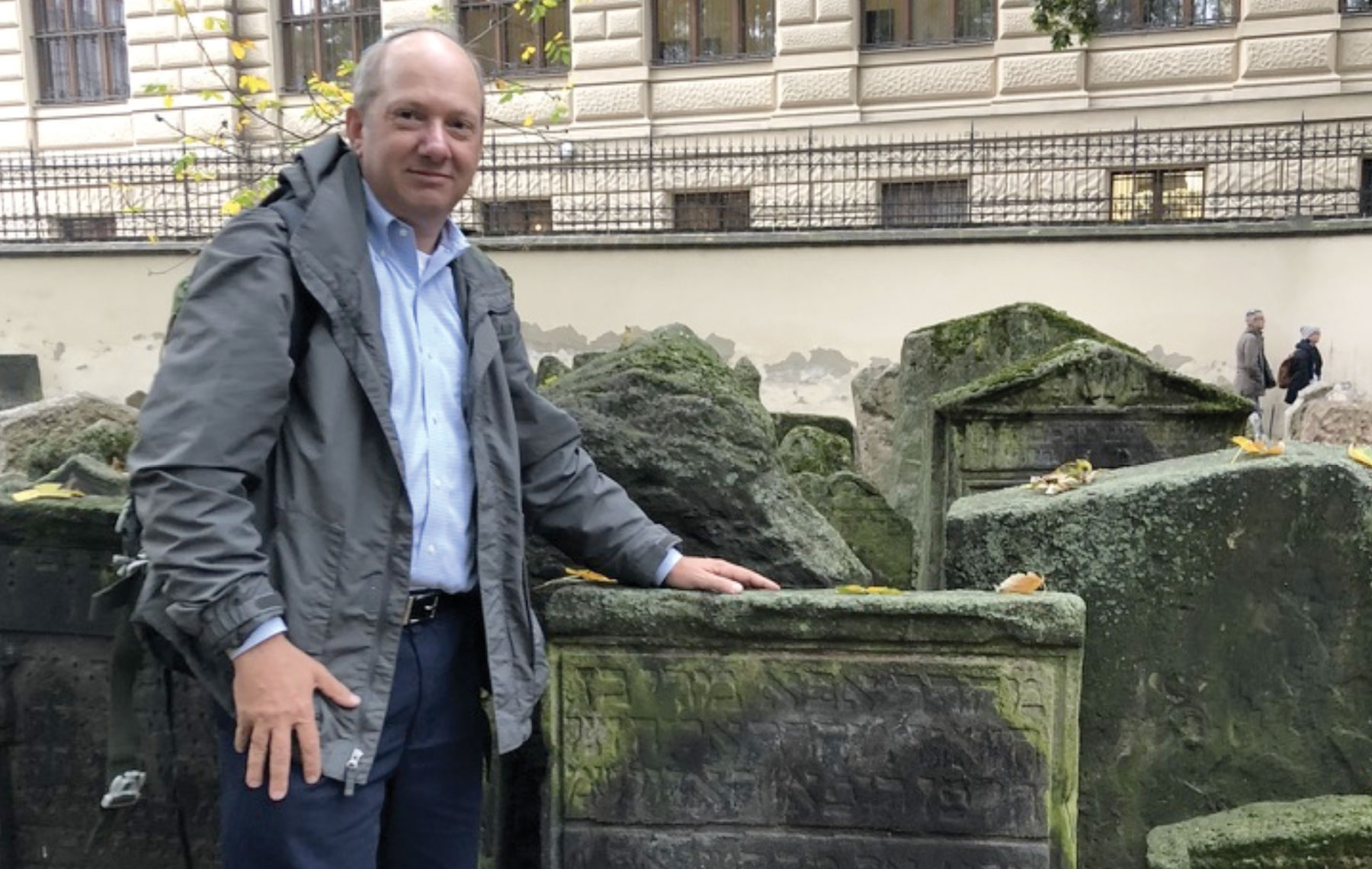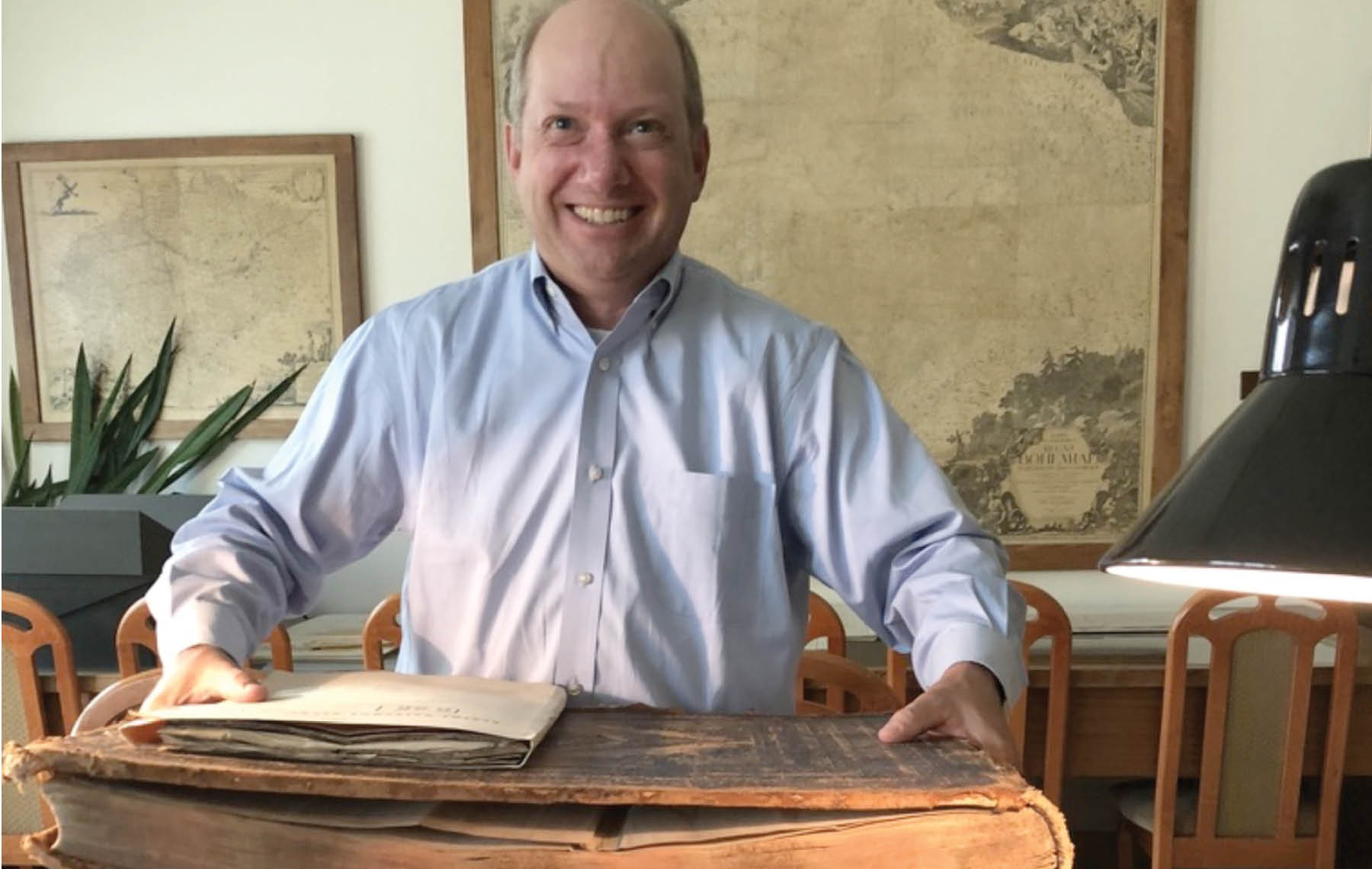 E. Randol Schoenberg at the grave of his ancestor, Abba Maria
Chalfan (d. 1685 Prague). Photo by Daniel Polakovic
E. Randol Schoenberg at the grave of his ancestor, Abba Maria
Chalfan (d. 1685 Prague). Photo by Daniel Polakovic For my presentation at the next Jewish genealogy conference scheduled for August 2020 in San Diego, I decided to be optimistically ambitious. Using original sources, I decided to document a direct ancestral line going back 500 years.
From the past 45 years of working on my family tree, I’ve learned my great-grandmother came from an old Prague family. In recent years, through secondary sources, I broke through and showed how she was related to the famous Maharal of Prague and many others. But I wanted to see for myself if I could prove these sources were correct. So in October, I went on a trip to Prague to find evidence.
I chose a different line from the Maharal because that seemed a bit too predictable; I selected the equally famous Maharik (Joseph ben Solomon Colon), perhaps the most influential Italian rabbi of the 15th century. Various sources made this quest seem possible but there were many steps along the way. This trip to Prague helped start me down the path.
Most Jews have a tough time tracing their families more than 100 to 200 years back, but if you are lucky and can find a connection to Jews living in large cities, going deeper is a real possibility. Pauline Nachod, the mother of my grandfather, Arnold Schoenberg, was born in Prague in 1848. Her ancestors are buried there in the crowded old cemetery — the one with all the headstones going this way and that.
I stayed with my cousin Michaela, whom I found more than 25 years ago after the end of Communism, and visited four archives during my week in Prague. My friend, expert genealogist Julius Müller, guided me the first day. In one branch of the national archives, I was a bit surprised to find a large police file from the mid-19th century for Pauline’s father, innkeeper Josef Nachod. I asked the archivist and he said this was quite normal, that some people have thick files of more than 1,000 pages. What was Josef’s crime? Apparently, he kept his inn open until 11:15 p.m. one evening and once was caught allowing two unlicensed musicians to perform. He also was sued for calling an old man who owed him money a dirty name. So no high crimes and misdemeanors, thank goodness.
Most Jews have a tough time tracing their families more than 100 to 200 years back, but if you are lucky and can find a connection to Jews living in large cities, going deeper is a real possibility.
In another branch of the archives, I saw the 1794 census where Josef’s father, Gabriel, is listed as a cantor; the official book that recorded Gabriel and Joseph’s family (there was a quota on Jewish families in Bohemia at that time, so the government kept track of everyone); and the 1849 death record for Gabriel which stated his profession as a wedding planner. After combing through seven boxes of tax records, I finally located the 1760 marriage permission for Gabriel’s parents, Avigdor and Pessel. I even held in my hands the enormous 1729 Jewish census book that registers Avigdor as a child living with his father, Moses, as well as Moses’ father, Benet, the son of Manis Nachod.
The municipal archives have more than 300 boxes of Jewish-community records that still are uncatalogued and off-limits to researchers. However, among the catalogued records are files from 1721 relating to Benet’s second marriage and some contracts concerning his house. I still need to decipher them to figure out what, exactly, they are. I also found marriage records from the 1730s, which will be very helpful for other families, but not this line.
I visited the archives of the Jewish Museum of Prague, where young archivist Tomas Krakora gave me the 1748 census page for when Moses Nachod and son Avigdor were admitted back to Prague after Empress Maria Theresa had expelled all the Jews for three years, and another record of the permission and taxes for Avigdor’s 1760 wedding to Pessel Bunzel (a descendant of the Maharal).

I went with Daniel Polakovic of the Jewish Museum to the old cemetery to find the family graves. Daniel, who has been working on a comprehensive database of the old cemetery, took me off the tourist path into the middle of the graveyard where we found in one section Moses (1759), Benet (1742), and Manis Nachod (1707), as well as Manis’ wife, Frumetl Ausch (1724). In another section, we found Frumetl’s mother, Jentl Chalfan (circa 1700), next to her mother, Kressel (1634), granddaughter of the Maharal’s brother Sinai.
Jentl’s father, Chaim Heschel Chalfan (1648), is buried in Vienna (the grave was buried during World War II and has not been excavated yet), but Chaim’s great-grandfather, Abba Mari Chalfan (1586), great-grandson of the Maharik, is buried in Prague. Daniel took a photo of me next to Abba Mari’s grave. Later, Daniel told me about a beautiful Torah curtain (parochet) donated by Manis and Frumetl Nachod on the birth of their grandson Moses, in 1697. This Torah curtain is now part of the collection of the Jewish Museum in Prague.
I tried to stay focused on one genealogical line on this trip, but I couldn’t help making some other investigations. My friend Fred Chvatal took me to Hresihlavy, a very small farming village about 90 minutes west of Prague, where the Jewish street looks pretty much the same as it did 220 years ago when my Zeimer ancestors lived there before moving to Prague. The cemetery there has gravestones
made from bright-red sandstone unique to this area. But the graves were from after my family left, so we went over to
the next village about 10 kilometers
away, Teresov, where we found some
older graves .
The success of this trip makes me eager to return. I am so lucky to have found so many traces of my ancestors, who lived for many centuries in this part of the world. Thinking of them walking the same streets made me feel almost like I was home.
E. Randol Schoenberg is an attorney and a law lecturer at USC.






















 More news and opinions than at a Shabbat dinner, right in your inbox.
More news and opinions than at a Shabbat dinner, right in your inbox.